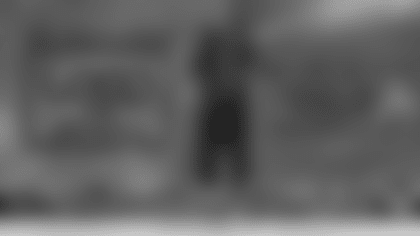A Weekly Conversation with Colts Head Coach Tony Dungy
Each week during the 2008 regular season, Colts Head Coach Tony Dungy will discuss topics pertinent to the Colts with Colts.com.
Question: A 34-14 loss to the Green Bay Packers Sunday, and now, you're looking ahead already to the Tennessee Titans, the Colts' opponent next week. What have you seen?
Answer: They drafted well and have gotten their free agents to fit what they want to do. They have put a nice team together. They're impressive.
Q: Back to the game Sunday. After a loss like that, when you come in on Monday and review tape, what are you looking to see?
A: You're trying to figure out how it happens. The little errors you make kind of compound themselves when you're playing a good team. The difference between being right in the game and possibly winning it and being blown out is just those little errors. We had them go our way against Baltimore (in a 31-3 Colts victory a week before) and on Sunday, they went the other way.
Q: And it seems the NFL re-teaches that lesson every week . . .
A: It really does. If both teams are playing well in the NFL, it tends to go back and forth and you have to make a play in the fourth quarter to win it, but if you don't play well and the other team does, you can be out of games pretty quick.
Q: As is so often the case, there were three or four plays Sunday in the first half – a penalty or two and a fumble on the ground come to mind – that if they go the other way, it's maybe a different story . . .
A: Even in the second half. It was 17-7 and we talked about it at halftime: 'We need to get a score and get it back to a one-score game.' We're facing 3rd-and-1 and we have a false start. Instead of having a first down at the 42-yard line we're 3rd-and-6 and we throw an interception for a touchdown. The difference is very slight sometimes.
Q: People sometimes tend to gloss over the penalty statistic. But when you take that statistic off paper and put it into game scenarios, you really see the impact penalties have . . .
A: They create big differences. On their first drive, we got them stopped around the 30-yard line. We had a holding penalty that gave them a first down. They were going to have to kick a 47-yard field goal into the wind. They might have still made it, but they might not have. They got to keep the ball four more minutes and kick an easy field goal. We got another one (in the second quarter) where (linebacker) Clint Session made a good play on a screen (pass) and it should have been 3rd-and-8. It ended up being an automatic first down and two minutes later they scored a touchdown. It was that way all day. You can't give good teams that many extra opunities. You can't take away opportunities from yourself. That's what Sunday's game was about and that's why it was 34-14.
Q: You've always been known as a coach whose teams were penalized very little. This has to bother you more than most issues would . . .
A: It does. All year we have had bad penalties. The first three or four games they just came at the wrong time. There weren't a lot of them, but still, we got a penalty on fourth down that cost us the game against Jacksonville. Then, we got 11 against Baltimore. That was uncharacteristic and we got more this week. We have to be technique-sound, doing things right, and avoid those. They will beat you.
Q: Does that have anything to do with the injuries? There have been so many guys in and out of the lineup in the first six games . . .
A: It shouldn't. We talk about it enough. We stress it. We coach everybody the same way. We shouldn't have those kinds of penalties.
Q: What is the ideal number of penalties? What's acceptable to you in a game?
A: Our goal is five or less. We figure two on offense, two on defense, one on special teams. You get one per half offensively and defensively and one during the game (on special teams). We've been very close to averaging five a game and that is going to put you in the upper echelon of the league. But seven, eight, 10, 12 – there's just no reason for it.
Q: You typically say during difficult times that the issues are correctable. But is this truly one of those cases where you just need to do the things you do well better?
A: It is. It's just doing what we should do, applying our techniques. I think we're playing plenty hard. We're trying to make things happen, but we're not playing sound and we're not playing smart. If we get that fixed, we can be back to where we want to be.
Q: You said after the game Sunday it was one of the sloppiest in your tenure with the Colts. Because of your demeanor, you're always asked in these situations if you need to get "tougher" on players . . .
A: (Smiling) Yeah, and I don't really know what that means, really, other than, 'Should you show people on the outside that you're visibly angry?' I guess that's what they want you to do. If you act like you're mad, then everybody feels better, but it doesn't help you play better. That's what we're after. We have to figure out a way to do that. We'll try to improve during this week of practice. We'll put emphasis on things we need to get better at and we'll work at it. Hopefully, that's what will make us execute better.
Q: You had several seasons as head coach in Tampa Bay from 1996-2001 where you overcame .500 or sub.-500 starts to make the playoffs. Did you "read the riot act" then to get things turned around?
A: (Laughing). No, we didn't and you're really harping on fundamentals and you're harping on doing things the way they should be done. That's what wins. That's what has won for the seven years we have been here.
Q: When a team struggles, people always seem to ask, 'What are you're going to change?' But what is there to change, really?
A: You focus on your details and everyone has to do their job. That's all you concentrate on, doing your job as well as you can. If you do, you're going to be in good shape. You don't need to lift more weights or run more gassers after practice. You just need to do your job. If we get 53 guys doing that, you'll be fine.
Q: But people want to hear, 'We're going to blitz more off the corner and that will solve everything . . .'
A: Usually, it doesn't.
Q: When you spoke to the media Monday, the day after the loss, you said after reviewing the tape was sort of the same story as previous weeks – that inconsistency and mistakes were key. About all that has been consistent about the Colts this season has been the inconsistency . . .
A: It has been. We've had good segments of games, but never really a good game all the way through. We haven't built and played a little bit better every week. We have been way more up and down than we ever have been. I don't know why other . . . I really don't know why. But that has been our MO all year.
Q: Do the penalties sort of go hand in hand with that?
A: I think that's part of it. I think it's a symptom. I think it's part of how we played, just inconsistently. When you're not playing well, you generally get penalties for whatever reason.
Q: The Colts are 3-3 entering Monday's game against 6-0 Tennessee. You have been on the opposite end of that situation many times in recent seasons . . .
A: For us, we've got to get ourselves where we play a very good game. I think that's what we're looking for. We haven't really played a team like this – a team that was rolling. We've played some good teams, but I don't think we've played anybody with a winning record when we played them. This is a team that is rolling and hitting on all cylinders. We're going to have to play a good game to win. That's our focus right now. It's not where we are in the standings or any of that. I think we'll know to win the division or to have a chance to win the division we're going to have to win this game, but it's not really about that. We're at Week 7 for us and we have to play an outstanding game.
Q: You usually don't say it that clear, that you have to win a game or basically be out of the division, but this week, you're very up front about that . . .
A: It's pretty obvious. We've been in that situation before and we've told our team that, 'Hey, we're three games up on these guys. If we beat them, they're going to have to win four more games than us in the second half of the year. Realistically, we can put the nail in their coffin right now.' I'm sure that's what they (the Titans) are saying and that's the way it is. But for us, the more important goal is going out and playing well.
Q: And when you faced this situation in Tampa, was it the same message, that it's not about the rest of the league?
A: If we play the way we can play and get going – and you have to have a performance like that before you can build off of it – that's what we have to concentrate on, that we have to go out against a good opponent, play the way we can play and get ourselves a win.
Q: Was it usually one game you could point to?
A: It was usually hard to say. It wasn't any moment where we said, 'This is it.' It was all of a sudden we would start playing better. We would start doing things, playing faster, playing with a little more confidence and then before you knew it, you had a winning streak put together.
Q: It's easy to forget after seven years that that was the MO in Tampa. Here, it usually has been about quick starts. There, it was far more common to be in a hole early and dig out . . .
A: 'Don't panic. Improve gradually as the year goes on. Play better in November and December.' If we do that, we're going to be in good shape as much as we don't like it right now.
Q: And even in years when you started well, you've always said the key is to be playing well in November and December, not September and October . . .
A: Absolutely. Pittsburgh proved that the year they won (the Super Bowl following the 2005 season) and the (New York) Giants last year. It's great to be out in front and get that lead and that's what we have done. It served us well, but your season is going to be made in the second half of the year.
Q: Overall, what's the message entering Tennessee week?
A: The message will be that we need to practice well. If we do, and we're sharp, we'll go down there with a lot of confidence and we'll play well. But preparing in practice is going to be what it's all about.














